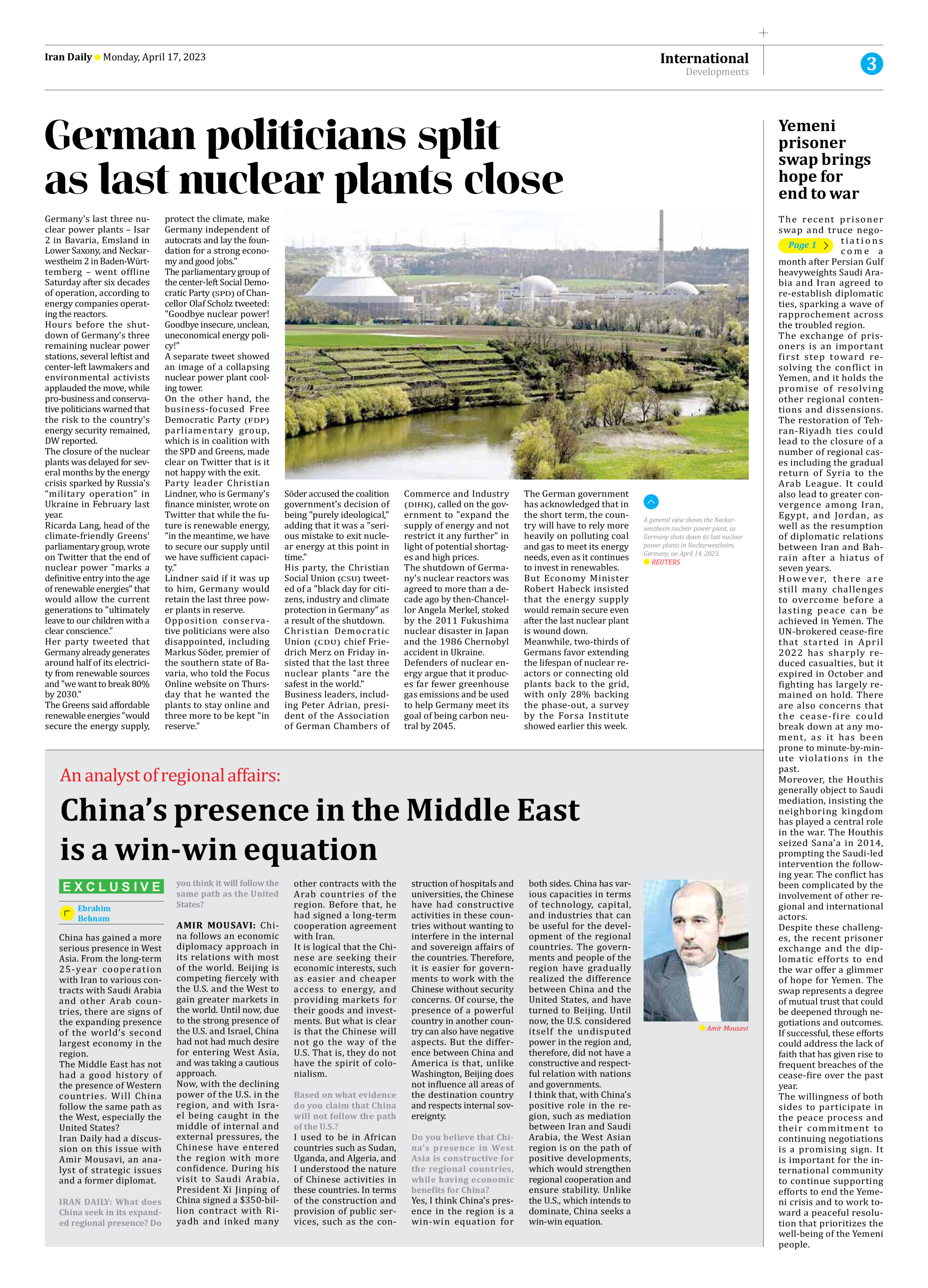
German politicians split as last nuclear plants close
Germany's last three nuclear power plants – Isar 2 in Bavaria, Emsland in Lower Saxony, and Neckarwestheim 2 in Baden-Württemberg – went offline Saturday after six decades of operation, according to energy companies operating the reactors.
Hours before the shutdown of Germany's three remaining nuclear power stations, several leftist and center-left lawmakers and environmental activists applauded the move, while pro-business and conservative politicians warned that the risk to the country's energy security remained, DW reported.
The closure of the nuclear plants was delayed for several months by the energy crisis sparked by Russia's “military operation” in Ukraine in February last year.
Ricarda Lang, head of the climate-friendly Greens' parliamentary group, wrote on Twitter that the end of nuclear power "marks a definitive entry into the age of renewable energies" that would allow the current generations to "ultimately leave to our children with a clear conscience."
Her party tweeted that Germany already generates around half of its electricity from renewable sources and "we want to break 80% by 2030."
The Greens said affordable renewable energies "would secure the energy supply, protect the climate, make Germany independent of autocrats and lay the foundation for a strong economy and good jobs."
The parliamentary group of the center-left Social Democratic Party (SPD) of Chancellor Olaf Scholz tweeted: "Goodbye nuclear power! Goodbye insecure, unclean, uneconomical energy policy!"
A separate tweet showed an image of a collapsing nuclear power plant cooling tower.
On the other hand, the business-focused Free Democratic Party (FDP) parliamentary group, which is in coalition with the SPD and Greens, made clear on Twitter that is it not happy with the exit.
Party leader Christian Lindner, who is Germany's finance minister, wrote on Twitter that while the future is renewable energy, "in the meantime, we have to secure our supply until we have sufficient capacity."
Lindner said if it was up to him, Germany would retain the last three power plants in reserve.
Opposition conservative politicians were also disappointed, including Markus Söder, premier of the southern state of Bavaria, who told the Focus Online website on Thursday that he wanted the plants to stay online and three more to be kept "in reserve."
Söder accused the coalition government's decision of being "purely ideological," adding that it was a "serious mistake to exit nuclear energy at this point in time."
His party, the Christian Social Union (CSU) tweeted of a "black day for citizens, industry and climate protection in Germany" as a result of the shutdown.
Christian Democratic Union (CDU) chief Friedrich Merz on Friday insisted that the last three nuclear plants "are the safest in the world."
Business leaders, including Peter Adrian, president of the Association of German Chambers of Commerce and Industry (DIHK), called on the government to "expand the supply of energy and not restrict it any further" in light of potential shortages and high prices.
The shutdown of Germany's nuclear reactors was agreed to more than a decade ago by then-Chancellor Angela Merkel, stoked by the 2011 Fukushima nuclear disaster in Japan and the 1986 Chernobyl accident in Ukraine.
Defenders of nuclear energy argue that it produces far fewer greenhouse gas emissions and be used to help Germany meet its goal of being carbon neutral by 2045.
The German government has acknowledged that in the short term, the country will have to rely more heavily on polluting coal and gas to meet its energy needs, even as it continues to invest in renewables.
But Economy Minister Robert Habeck insisted that the energy supply would remain secure even after the last nuclear plant is wound down.
Meanwhile, two-thirds of Germans favor extending the lifespan of nuclear reactors or connecting old plants back to the grid, with only 28% backing the phase-out, a survey by the Forsa Institute showed earlier this week.







